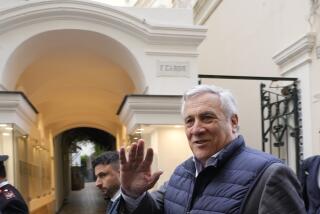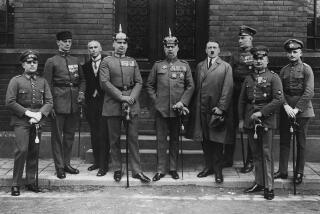Shultz, Italian Trade Scoldings on Palestinian
- Share via
BRUSSELS — Secretary of State George P. Shultz scolded Italian Foreign Minister Giulio Andreotti on Tuesday for his government’s decision to let a Palestinian terrorist leader leave the country, but the Italian official delivered an equally strong response, complaining of unwarranted American pressure on his government.
Shultz, in an interview with The Times en route here, also indicated that he will call on all European nations to take the first step toward punishing countries that sponsor terrorism by cutting diplomatic and economic ties with Libya.
Shultz told Andreotti, in a brief meeting at the headquarters of the North Atlantic Treaty Organization here, that he found Italy’s actions “incomprehensible,” U.S. officials said.
But Andreotti responded that Rome’s action freeing Palestine Liberation Front leader Abul Abbas had been legally correct, Italian diplomats said.
Coalition in Danger
Italy’s coalition government, headed by Prime Minister Bettino Craxi, is in danger of falling because of the domestic furor over the release of Abbas and Craxi’s support for the Palestine Liberation Organization.
The United States has accused Abbas of masterminding the operation that led to last week’s hijacking of the Italian cruise liner Achille Lauro and has charged that the four hijackers, also members of the PLO splinter group, murdered retired New York businessman Leon Klinghoffer, a passenger on the liner. In addition, the United States says that Abbas has a long history of terrorist activity against Israel.
“We acted under our interpretation of Italian extradition law and our treaty with the United States,” said an Italian official. He added that his government was offended when U.S. officials woke up Italy’s justice minister last Saturday at 5 a.m. to deliver a warrant for Abbas, which included a request for a provisional arrest pending a formal petition for extradition.
The controversy over Italy’s handling of the affair--and over Reagan Administration demands for European support of its tough counterterrorism policy--injected a divisive note into a meeting that was intended to shore up Western unity in advance of next month’s summit meeting between President Reagan and Soviet leader Mikhail S. Gorbachev.
A Blunt Reaction
When asked at a news conference after his meeting at NATO headquarters if “the incident was closed” with the Italian government, Shultz replied bluntly:
“We haven’t composed our differences about the release of Mr. Abbas. We are glad to know that the Italian government will indict him if they find the evidence conclusive, but we disagree,” he said.
“We believe there is evidence at hand that he was part of this hijacking and also part of the murder of an American citizen and should have been held onto,” Shultz said. “The Italian government took a different view of the matter.”
In spite of his confrontation with Andreotti, Shultz said that U.S.-Italian relations remain strong and that he admires the way the Italians have approached the problem of terrorism. And a senior State Department official said later that Shultz and Andreotti have agreed to take action in the near future to “clear the air,” although he refused to be specific about the nature of such action.
Shultz said he has “full confidence that the four prisoners they (the Italians) are holding will be tried in accordance with their laws in a very strong way.”
Exasperated Response
But, during his interview with The Times, Shultz raised his hands in exasperation and called Italy’s decision to release Abbas “inexplicable.”
“How you let a guy go who was involved in a murder, let alone the other acts (of hijacking and terrorism), is beyond me,” he said.
Shultz said he did not believe that Italy released Abbas out of fear of reprisal “because they have dealt very strongly with terrorism” in the past.
However, drawing on what he called the most positive lesson of the hijacking of the liner Achille Lauro--the action of several countries in denying entry to the liner while it was under the hijackers control and refusing sanctuary to the hijackers when they left Egypt--Shultz said that similar firm action could be taken against countries such as Libya and Iran that support terrorists.
“The principle of no sanctuary for terrorists . . . said the ship won’t be allowed in a port. It said the (EgyptAir) plane (carrying the hijackers out of Egypt) won’t be allowed in an airport. Now, if (Libyan leader Moammar) Kadafi is a terrorist, then you’re gradually saying Libya can’t go anywhere,” Shultz said.
“Who wants to trade with them? Who wants to deal with them?” he asked.
“In the case of Libya, we have cut off all our trade . . . as best we can,” he said. “I think perhaps gradually others may do so. But we’re a long way from that.”
Willing to Use Force
Shultz said that he sensed increased public willingness to consider military action against terrorists, though he added: “You need to have a good clear shot at the people who you’re really after. And, obviously, we don’t want to use violence ourselves, but we have to be prepared to use it if necessary.”
The secretary, referring to the U.S. interception of the hijackers, said: “The point is that we were prepared and that the President is ready to take action when he sees an opportunity to do so against terrorists. Being prepared, when something happened and a way of doing it appeared, he decided.”
Shultz, with a snap of his fingers, emphasized: “He decided like that.”
He said another effect of the hijacking was to discredit the Palestine Liberation Organization as a possible negotiating partner with Israel. “I don’t think you can imagine yourself at a peace table with people who are using the tactic of terrorism at the same time,” he said. But the secretary noted that the Palestinian people should still be represented in any peace talks.
Shultz said he considers the Soviet Union’s statement of support for the U.S. action against the hijackers to be a positive development. “Maybe there’s a little opening there” for joint efforts against terrorism, he said. “Certainly we want to talk about it with them.”
Times staff writer Don Cook, in Brussels, contributed to this story.
More to Read
Sign up for Essential California
The most important California stories and recommendations in your inbox every morning.
You may occasionally receive promotional content from the Los Angeles Times.











